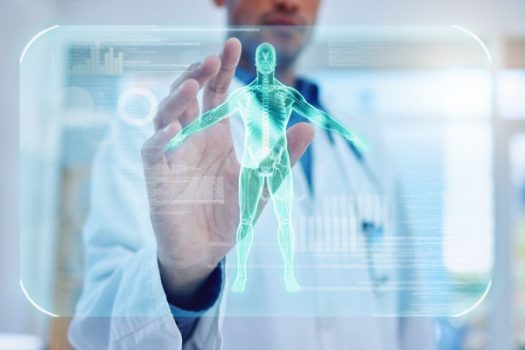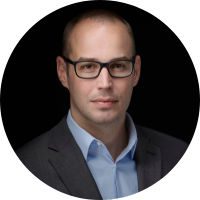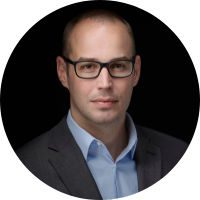
Tell us about Iktos and your role with the company.
Iktos offers Generative AI-driven software solutions for medicinal chemists engaged in de novo drug design. Our platform, Makya, generates in silico libraries of possible small molecule drug candidates based on the client’s existing data or hypotheses. A drug hunter with knowledge of key binding interactions from a known ligand can direct Makya to suggest unique, patentable molecules likely to maintain those interactions while improving druglike properties. In the absence of structural data, a list of known active and inactive compounds can also be used to train models which guide Makya in predicting new active scaffolds.
A key differentiator for Iktos is the integration of Spaya, our retrosynthesis planning software. Spaya ensures suggested molecules are synthetically feasible, and can return full synthetic routes to small molecule targets from commercially available precursors. It was designed by chemists, for chemists, and can be customized in a variety of useful ways.
My role at Iktos is to connect potential clients to Iktos tools, either through SaaS (“Software-as-a-Service”) licenses or as part of research collaborations. I reach out to companies with small molecule pipelines that will be able to benefit from our approach and develop these conversations into proposals.
How do you anticipate AI to impact drug discovery in the near term? Long term?
Enormous progress has been made over the last few years towards development of reliable Machine Learning models to predict pharmacological properties for small molecules, and the deployment of these models with a Generative AI is already bearing fruit in the early discovery space. Huge amounts of data can now be more efficiently explored and hypotheses validated in fewer cycles than ever before. This means better therapeutics discovered for less cost. We should see this effect in the coming years as more AI designed drugs come to market.
What are the benefits and challenges of working remotely for a global company?
Transitioning to fully remote work unlocks the entire world. As a BD person, it allows me to pursue an exciting opportunity at a French company like Iktos, and it allows Iktos to maintain an additional footprint on both coasts of the US, as well as Japan, at effectively zero cost to itself and with enormous savings in time and effort to its employees.
There are still some important limitations. Business Development, while technically a remote role, is very much an in-person job. I have yet to close a deal without at least one in-person meeting. The resources that used to go towards getting to the office everyday are reallocated to on-site visits, attending tradeshows, and networking events. A lot of work has to happen “on the go” in hotels, airports, and wherever else I can find WiFi. While there is certainly more flexibility in where one can live, it does help to settle near a hub for your industry. For most US Pharma roles that means Boston, the Bay Area, or Southern California. This cuts down on travel, and makes it easier to build personal connections with industry professionals.
You started out as a synthetic organic chemist before moving into business development. How did you make that transition?
Before joining Iktos, I worked at a small molecule CDMO called Cascade Chemistry (now Actylis). I started as a bench chemist, and stayed in that role for three years. In that time, Cascade grew significantly and eventually needed to expand the sales team, so the leadership asked me directly. I had never considered BD as a career option but saw it is a unique opportunity and the Head of BD was someone I knew I could learn a lot from.
This is a common trajectory. A salesperson with sufficient technical background is highly valued at CDMOs, and internal candidates with experience operating in the facility they will be selling have a huge advantage. Willingness to train my replacements helped enormously in making the transition. It overcame the largest obstacle the company faced hiring internally: replacing skilled labor. It was also the ideal way to prepare to sell the service and build rapport with the team I was soon depending on.
My advice to someone considering a switch from lab to BD is to view every aspect of your current role with the intention of eventually training your replacement, with the understanding that you will still be responsible for the quality of their output. Take this seriously, and when the opportunity presents itself, you will be a uniquely qualified candidate with a well-developed transition plan.
Describe your leadership style.
I have been fortunate to have had several great mentors throughout my career. I try to emulate what made them effective. Good leaders set clear, high expectations and exemplify them. They create opportunities to learn new skills and help cultivate greater independence and ownership in their team members.
How do your personal and professional passions complement each other?
I enjoy learning, which is an obvious benefit in any field. I can be a bit obsessive about ideas I am interested in. The best way to harness this is maintaining a side project in an area adjacent to what I do professionally. Most recently and by far most rewarding has been learning to code. This came from a desire to automate the more tedious tasks that were part of my job. I started with Python, discovered Pandas, and then RDKit, and now I code every day.
What career advice would you give your younger self?
Get a copy of “Automate the Boring Stuff with Python” by Al Sweigart and start coding sooner. Programming skills are useful in any profession, and life in general. Combined with a STEM specialization, they become a superpower. Also, unlike other scientific disciplines, there is no expensive lab infrastructure required. You need a laptop, an internet connection, and some curiosity.
What are you looking forward to in the next year? Next 5 years?
It has been a little over a year since the release of Chat GPT 4. In that time the AI landscape has changed dramatically. We are witnessing the birth of a new industry, and the pace of innovation appears to be accelerating. I anticipate the next year to bring even more compelling ideas and advances in technology.
Over the next five years I am excited to see more scientists and professionals adapt computational techniques to their fields, with a learning curve continuously flattened by the wonderful ecosystem of open-source communities that now exist, and perhaps with the creative use of ChatGPT. I know what a game-changer this has been for me personally, and there are many others like me who had overlooked programming earlier in their careers but are now inspired to take the leap by the impact of AI.
About the Contributor

Mac Monson is a Business Development Manager at Iktos, an early adopter of AI-based approaches to drug discovery headquartered in Paris. He began his career as synthetic organic chemist and prior to joining Iktos has held several industrial positions in addition to teaching chemistry at Lane Community College in Eugene, Oregon. He received his BS in Chemistry from the University of Oregon and an MA from the University of Southern California.
This article has been edited for length and clarity. The opinions expressed in this article are the author's own and do not necessarily reflect the view of their employer or the American Chemical Society.













